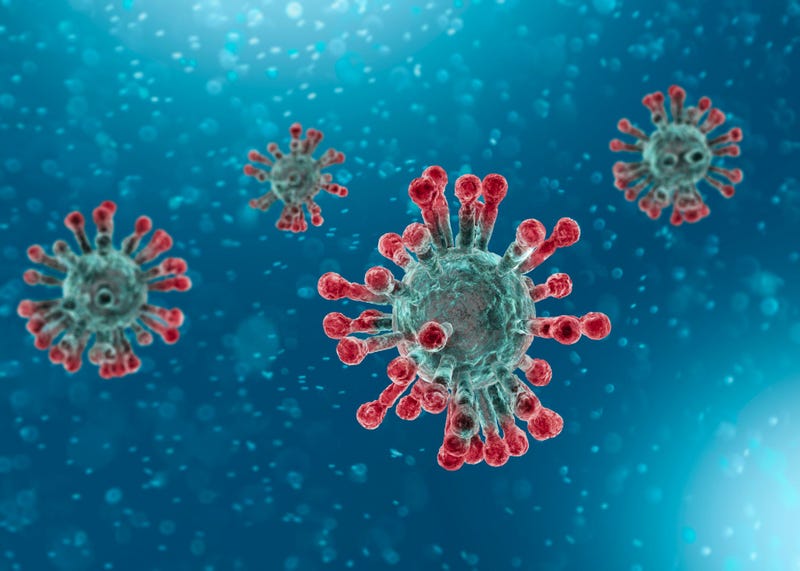
Coronavirus trends, heart concerns in pregnant women and the Saharan Dust Cloud -- all topics in this weekend's Health Matters Presented By SSM Health show on KMOX.
COVID-19 is seeing big increases all across the United States. SLU Care general internist Dr. Fred Buckhold at SSM Health Saint Louis University Hospital says the overall trend in the St. Louis area is pretty good -- but there are some worry spots.
What do we know about asymptomatic spread of COVID-19? Infectious diseases specialist Dr. Alex LaCasse at SSM Health St. Mary's Hospital tells us it is more common than first believed and he explains why the World Health Organization has had to clarify earlier remarks it made about how the virus is transmitted.
SSM Health fetal maternal medicine specialist Dr. Allen Fisher at SSM Health St. Mary's Hospital addresses a new study that finds many pregnant women are not getting a recommended echocardiogram -- which would alert doctors to possible heart defects that could greatly endanger their baby.
And this weekend's arrival of that Saharan Dust Cloud over the St. Louis area could cause some problems for people with breathing concerns and lung conditions like asthma and COPD. Pulminologist Dr. Mohsin Ehsan at SSM Health St. Joseph Hospital in St. Charles says it would be wise for some to stay indoors, in air conditioning and if you must go outside, wear a mask.
To listen to this weekend's show below:
Here is the complete rundown of this weekend's show:
Health Matters -- June 27, 2020 - 4pm
1. Dr. FRED BUCKHOLD, SLU Care general internist at SSM Health Saint Louis University Hospital. Over half of the nation is seeing an uptick in new coronavirus cases -- 32 states. Dr. Buckhold says the overall trend in Missouri and the St. Louis area is good. The seven day rolling average is the key. He says we are still in the first stage. The CDC now says coronavirus cases in the U.S. may now be more than ten times higher than reported. Dr. Buckhold says this has a lot to do with asymptomatic spread of the virus. CDC adds three new symptoms for COVID 19 -- runny nose, diarrhea, and nausea. Dr. Fauci says the White House is looking at a new testing strategy - pool testing. What is this? Dr. Buckhold says travel restrictions by three northeastern governors may be necessary to keep their states safe. Same thing with a possible EU ban on U.S. travel to their countries. And a new study says in order to lower your risk of cancer, we should not drink alcohol.
2. Dr. ALEX LaCASSE, infectious diseases specialist at SSM Health St. Mary's Hospital. Lots of confusion over how common it is for coronavirus to be spread by people without symptoms -- or asymptomatic transmission. The World Health Organization now says it isn't that rare, can happen and there is still much to learn while more research is needed. How can someone without symptoms spread the virus? Dr. LaCasse says by spitting while speaking and not covering sneezes and coughs. Dr. LaCasse says you can have symptoms up until 14 days before you end up with the symptoms. That's why he says it is critical to wear a mask, keep up with the six feet of separation and practice good hand hygiene. What's behind the increase of COVID-19 cases in our younger population? Dr. LaCasse says those cases are much milder but still dangerous because they still can be spread to older members of the family. And he says younger people are more likely to get out and about and are increasing their public contact.
3. Dr. ALLAN FISHER, maternal fetal medicine physician at SSM Health St. Mary's Hospital. A new study published in the American Heart Association journal Circulation finds women with heart defects experience more cardiovascular problems than women without problems -- but just about half are getting a recommended echocardiogram. How common are heart defects in pregnant women? 8 out of a thousand people are born with a heart defect, half are minor. Most are caught in childhood. It's more common than you would think. He says early detection of heart defects is critical to a healthy pregnancy. How can women have a healthy pregnancy even before conception? Dr. Fisher says to eat a healthy diet, take folates and lead a healthy life overall. Sometimes cardiac problems during pregnancy can lead to high blood pressure later in life, and diabetes -- mainly due to pre-eclampsia.
4. Dr. MOHSIN EHSAN, pulminologist with SSM Health St. Joseph Hospital in St. Charles. A massive cloud of Saharan dust is in the St. Louis area this weekend. What might this mean for people with lung conditions? Dr. Ehsan says this is an unusual event. The dust has two size particles. The bigger particles can cause irritation of the eyes, nose and throat and can cause sneezing, coughing and wheezing. This is bad for people with asthma and COPD. Smaller particles, meanwhile, can get into the lungs and make current health problems worse. Also could be bad for people with cardiac conditions. To protect yourself, Dr. Ehsan says stay indoors in air conditioning. If you must go out, wear a mask. What is Dr. Ehsan seeing that concerns him about coronavirus? People with underlying lung conditions have more serious complications if they get COVID-19. He says doctors have learned how to better treat people with coronavirus -- don't let them lie on their backs so long, and he says more judicial use of ventilators is being done now. Also now using steroids and convalescent plasma therapy to treat these lung conditions.
